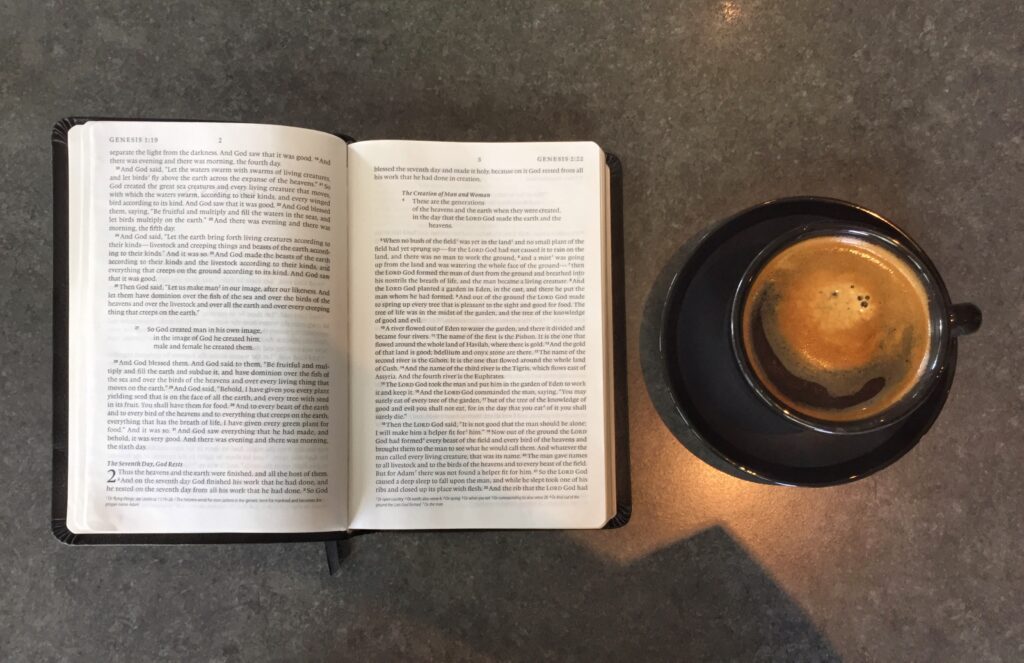A reflection on Matthew 13:24-30 & 36-43 for Sunday, August 29, 2021 at Mosaic Baptist Church

He put before them another parable: ‘The kingdom of heaven may be compared to someone who sowed good seed in his field; but while everybody was asleep, an enemy came and sowed weeds among the wheat, and then went away. So when the plants came up and bore grain, then the weeds appeared as well. And the slaves of the householder came and said to him, “Master, did you not sow good seed in your field? Where, then, did these weeds come from?” He answered, “An enemy has done this.” The slaves said to him, “Then do you want us to go and gather them?” But he replied, “No; for in gathering the weeds you would uproot the wheat along with them. Let both of them grow together until the harvest; and at harvest time I will tell the reapers, Collect the weeds first and bind them in bundles to be burned, but gather the wheat into my barn.”’
…Then he left the crowds and went into the house. And his disciples approached him, saying, ‘Explain to us the parable of the weeds of the field.’ He answered, ‘The one who sows the good seed is the Son of Man; the field is the world, and the good seed are the children of the kingdom; the weeds are the children of the evil one, and the enemy who sowed them is the devil; the harvest is the end of the age, and the reapers are angels. Just as the weeds are collected and burned up with fire, so will it be at the end of the age. The Son of Man will send his angels, and they will collect out of his kingdom all causes of sin and all evildoers, and they will throw them into the furnace of fire, where there will be weeping and gnashing of teeth. Then the righteous will shine like the sun in the kingdom of their Father. Let anyone with ears listen!’
Matthew 13: 24-30 & 36-43 (NRSVA)
The memorable parable of the weeds and wheat can all too easily be read and interpreted as a story of judgment. Who hasn’t heard this told with a tone of warning and threat?
There is an interpretive key, however, that may help us reconsider the message of this particular riddle. We all too easily miss the distinct nature of the particular weed Jesus chooses to refer to. ‘Zizanion’ is the Greek word we translate broadly as ‘weeds’. It is, in fact a specific weed known for resembling wheat. In fact, ‘zizanion’ is almost indistinguishable from wheat, that is, until it reaches maturity and is ready for harvest.
What we miss would have been obvious to Jesus farming audience.
The implication of Jesus selection of this particular weed is obvious: we cannot distinguish between those who are ‘good’ and those who are ‘evil’ until they bear fruit. Indeed, this account insists that even the angels cannot accurately make this assessment before harvest. Jesus’ fictional slaves ask, ‘“…do you want us to go and gather them?” The master’s reply: “No; for in gathering the weeds you would uproot the wheat along with them.”
In judging the future fruit of another, we walk where angels fear to – or at least are instructed not to – tread.
This is the reality in this world. We cannot see the validating fruit – in ourselves or in others – before harvest. Even then, discerning and judging ‘…all causes of sin and all evildoers…’ is not our task. Only God sees accurately enough to take such a role.
Strangely enough, this is anything but a story designed to make us judgmental and critical. Rather, it is one that should lead us to humility as we learn to represent the kingdom of heaven in a world we are unable to simplistically divide into good and bad.
I suspect that it is this Jesus-highlighted inability to discern between good and evil that causes Matthew to bracket the parables of the mustard seed and the yeast with this account of the simultaneous growth of wheat and weeds.
In a world where both grow, we are called to humbly do small, hidden, and living acts trusting God to do more with them than we can possibly imagine.
After all, good and evil will, in time, be revealed – by its fruit!
Until then, we are called to plant small mustard seeds and mix yeast with flour. Small, hidden acts of grace that will one day be revealed by their fruit.
Conversation Starters:
Do you think you are prone to believe you can discern good and evil in others more than you are actually able to? Do you think you are prone to believe you are able to discern yourself more accurately?
In what ways are we prone to measure who is ‘in’ the kingdom and who is ‘out’? Does this go beyond the call of this parable?
Do you think that this parable implies that wheat can become weeds? Do you think it implies that weeds can become wheat? In what sense is Jesus’ parable both hopeful and a warning?